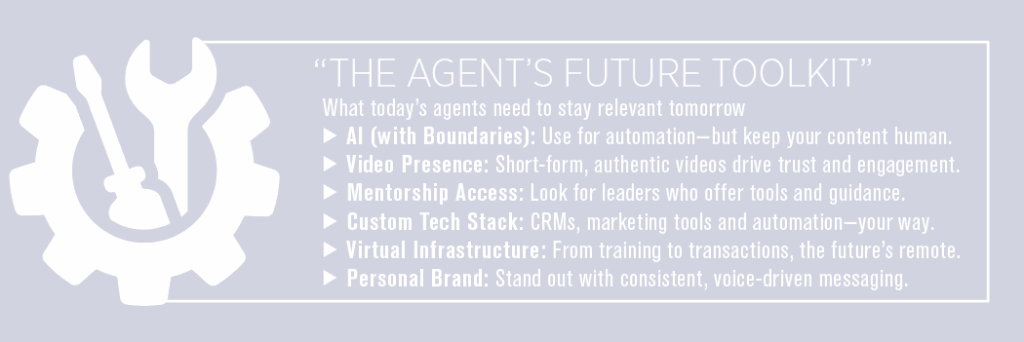By Gina Tron
As virtual brokerages, blockchain and AI reshape the industry, agents are navigating a bold new landscape—one where individuality, authenticity and flexibility are key.
The structure of the real estate profession is undergoing a fundamental shift. Traditional models are giving way to new frameworks that reflect a more decentralized and digitally driven landscape. As agents reimagine their careers around personal branding, location independence, and emerging technologies like AI and blockchain, a new blueprint is taking shape.
The Rise of Flexible Work Models
Real estate is no longer bound to office desks or traditional team hierarchies, and few understand that shift better than Tim Kinzie, CRS, in Cary, North Carolina. Over a decade ago, he launched one of the country’s first cloud-based brokerages, embracing a model prioritizing flexibility and lean operations.
“Real estate is an interesting industry because we don’t actually own any inventory,” he notes. “We’re all intermediaries and we are brokering the expertise of knowledge workers.”
Seeing the mismatch between low-overhead services and high-overhead business models, Kinzie questioned the old structure.
“It just made more sense to eliminate that choke point so that you can create better profit margin for the people you hire.”
In his view, virtual brokerages aren’t just more modern. They’re fundamentally more efficient and profitable.
Autonomy vs. Support
In this newly evolving landscape, it can be hard to pick the right fit. Kinzie cautions that new agents often lack the tools to evaluate support models properly.
Even the best company can be the wrong fit if the model isn’t aligned with the individual. Kinzie urges agents to prioritize environments that support their growth and preserve their individuality.
“You don’t want to join a company that creates restrictions on how you’re able to legally and lawfully and ethically express yourself.”
While every agent must follow fair housing laws and advertising regulations, he cautions that some brokerages add extra layers of restriction that aren’t tied to any formal rule—but can still stifle individuality. That might mean forcing agents into rigid branding templates, prohibiting personal video content or discouraging authentic storytelling that doesn’t conform to the corporate mold.
To him, autonomy only works when it’s paired with the right foundation—one that supports exploration without stifling voice.
In the future of real estate, an agent’s individual voice may be one of the most important differentiators they have.
Blockchain Could Shake It All Up
Kinzie sees blockchain as the most disruptive—and promising—technology on the horizon. Its potential to streamline transactions, eliminate inefficiencies and open up new ways to buy and sell property is, in his view, not a matter of if, but when.
“Once we move to a perfect data set on blockchain, it’s going to eliminate so much of the minutiae and errors. That’s inevitable.”
He envisions a near-future where blockchain-based systems handle title verification, ownership records and transaction flows. In that world, closing attorneys and title insurers could become obsolete.
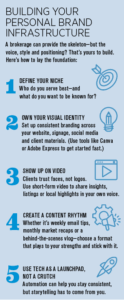 Kinzie’s excitement goes beyond just paperwork. He believes blockchain could fundamentally change how people own and invest in real estate—opening the door to true fractional ownership. That means buying a small equity stake in a property, not just time-based usage like in a timeshare.
Kinzie’s excitement goes beyond just paperwork. He believes blockchain could fundamentally change how people own and invest in real estate—opening the door to true fractional ownership. That means buying a small equity stake in a property, not just time-based usage like in a timeshare.
“What if you could go on a market center and buy a little bit of a Santa Cruz house in California?” he asks. “It’s just a more freely tradable market.”
For Kinzie, blockchain isn’t just another tech trend—it’s a paradigm shift.
AI Could Replace the Replaceable
Technology has radically reshaped how agents work, but for Kinzie, not all change is good. While AI automation can boost efficiency, he draws a firm line when it comes to content creation.
“You can see AI writing a mile away now,” he says.
Because of that, Kinzie prohibits his agents from using AI to generate content. He believes authenticity is a competitive advantage and AI output lacks the nuance clients connect with.
“The future belongs to storytellers with a human voice.”
Kinzie doesn’t think AI will replace the human touch, but he believes it will replace mediocre writing and workers.
“You can replace bad writing,” he says. “But you can’t really replace storytelling delivered in a way that is uniquely yours.”
He emphasizes, “If you’re replaceable, then you’re going to be replaced.”
More Focus on Individuality
Kinzie sees individuality as one of an agent’s greatest future assets. To stay irreplaceable, authenticity has to come first, not a carbon copy of someone else’s success.
“I think it’s going to be more important than ever,” he says. “You need to be the best version of you.”
Kinzie advocates for models that give agents a strong foundation—a “skeleton” made up of systems, tools and mentorship—but he’s clear that’s just the starting point. Eventually, every agent needs to branch out and build something uniquely their own.
“Agents really need to figure out ways to rely on their personal branding rather than rely on brokerage branding,” he says.
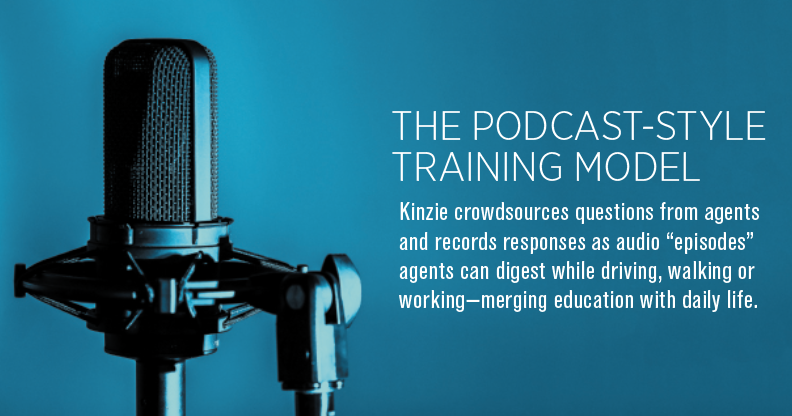
The future, he argues, won’t reward conformity—it will reward bold voices. In a noisy market, standing out won’t come from repeating scripts; it will come from showing up as yourself. That authenticity, when utilized through social media channels, will be what truly resonates.
“We are rapidly entering into a future where people are going to be hungry for authenticity.”
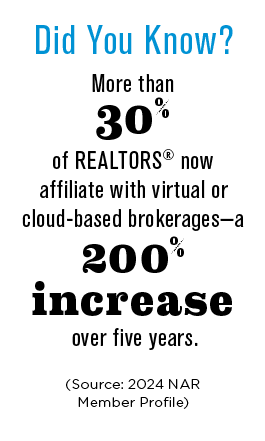 Rethinking Culture and Connection
Rethinking Culture and Connection
Fostering team cohesion in a remote-first real estate environment takes more than just Zoom check-ins. It requires a fundamental rethinking of how culture and learning are delivered.
Instead of relying on meetings—which Kinzie sees as inefficient and often a drain on productivity—he’s built a system where training is delivered as on-demand media. The idea is to keep agents immersed in leadership’s mindset without bogging them down with live sessions.
“We treat training like a podcast,” he explains. “We’ll crowdsource topics and scenarios from our agent pool, and then we’ll answer questions and concerns, but we’ll do it in a way that they can digest as they go through their lives.”
The goal is for agents to absorb not just information, but culture. He believes that regular exposure to the voices, tone and communication style of leadership drives alignment.
What New Agents Need To Know
For new agents, mentorship can be a game-changer, but only if it’s coming from someone who truly knows how to build others up.
“If you can find a mentor who is world-class, who not only understands how to do this, but has set up the systems, the tool set and an infrastructure for you to grow within—and they care about you, then it would be fundamentally foolish not to work with them,” Kinzie says.
For him, this belief is personal.
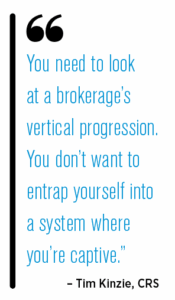 “I didn’t have a leader when I came up,” he says. “It was awful. My first year was miserable.”
“I didn’t have a leader when I came up,” he says. “It was awful. My first year was miserable.”
That experience fuels his commitment to making sure others don’t go through the same struggle. In his model, mentorship isn’t optional; it’s structural. He wants agents to feel guided and equipped from the start.
Still, he warns that not all mentorship models are worth buying into. If a brokerage limits growth, no mentor can make up for a system that stifles potential.
“You need to look at a brokerage’s vertical progression,” he adds. “You don’t want to entrap yourself into a system where you’re captive.”
And if real mentorship isn’t available?
“If the mentorship is lacking, agents may as well do it themselves.”
As agents explore new models and redefine what success looks like, they must balance freedom with structure, digital tools with human voice and ambition with authenticity.
“The people that should win,” Kinzie says, “are going to win even more.”


